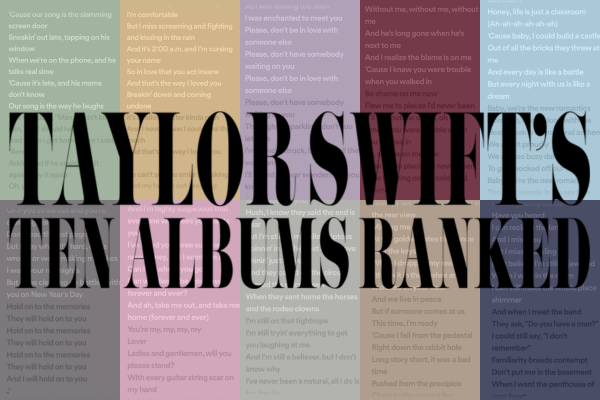Ranking Taylor Swift's 11 Albums: A Critical Analysis

Table of Contents
Taylor Swift (2006) - The Debut
Country Roots and Early Influences
This self-titled debut album cemented Taylor Swift's place in the country music scene. It showcased her raw talent for songwriting, focusing on relatable themes of first love, heartbreak, and the anxieties of adolescence. The album's success launched her career and provided a blueprint for future work.
- Key Tracks: "Tim McGraw," "Teardrops on My Guitar," "Our Song" exemplify her early songwriting prowess and ability to craft catchy melodies.
- Songwriting Style: Simple, direct lyrics, often using country instrumentation and storytelling techniques.
- Commercial Success: The album reached number five on the Billboard 200 and achieved platinum certification multiple times, demonstrating immediate fan acceptance.
Fearless (2008) - A Breakthrough
Evolution and Expansion
Fearless marked a significant leap forward. While retaining its country roots, the album demonstrated a wider musical scope and greater lyrical complexity. It broadened her appeal beyond country fans, establishing her as a major pop star.
- Popular Tracks: "Love Story," "You Belong With Me," and "Fifteen" became anthems for a generation, resonating deeply with listeners.
- Success and Awards: Fearless won numerous awards, including Album of the Year at the Grammy Awards, solidifying its place in music history.
- Themes: The album explored themes of growing up, navigating relationships, and the bittersweet experiences of youth.
Speak Now (2010) - Storytelling at its Peak
Narrative Depth and Musical Growth
Speak Now showcased Taylor Swift's maturing songwriting skills. The album is characterized by its intricate storytelling, longer song lengths, and a more sophisticated musical arrangement compared to her earlier works.
- Key Tracks: "Mine," "Back to December," and "Sparks Fly" are examples of her expanded narrative abilities and musical experimentation.
- Intricate Narratives: Many songs tell extended stories, showcasing a depth and complexity rarely seen in pop music.
- Themes: Speak Now delves into themes of love, loss, self-discovery, and the complexities of human relationships.
Red (2012) - A Rollercoaster of Emotions
Exploring Genres and Emotional Range
Red is a genre-bending masterpiece that perfectly encapsulates the emotional rollercoaster of a passionate, yet tumultuous, relationship. It seamlessly blends country, pop, and rock elements, creating a diverse sonic landscape.
- Key Tracks: "We Are Never Ever Getting Back Together," "All Too Well," and "22" exemplify its emotional range and genre experimentation.
- Genre Blending: The album expertly blends different musical genres, reflecting the complexities of the emotions being expressed.
- Complex Relationships: Red explores the nuances of love, heartbreak, and the complexities of navigating romantic relationships.
1989 (2014) - The Pop Transformation
A Bold Pop Pivot
1989 marked Taylor Swift's complete transition to pop music. This bold move was met with critical and commercial success, demonstrating her versatility and adaptability as an artist.
- Key Tracks: "Shake It Off," "Blank Space," and "Bad Blood" became global hits, showcasing her evolution as a pop icon.
- Production and Influence: The album's sophisticated production and catchy melodies heavily influenced the pop music landscape.
- Themes: 1989 explores the themes of fame, relationships in the spotlight, and the challenges of maintaining a sense of self amidst intense public scrutiny.
Reputation (2017) - A Darker, Edgier Sound
Exploring Controversy and Maturity
Following a period of intense media attention, Reputation presented a darker, edgier side of Taylor Swift. The album delved into themes of revenge, resilience, and navigating a public image.
- Key Tracks: "...Ready for It?", "Look What You Made Me Do," and "Delicate" represent the album's multifaceted sound and lyrical themes.
- Darker Synth-Pop Sound: A departure from previous styles, the album embraced a more mature, synth-pop sound.
- Themes: The album addresses themes of public image, media scrutiny, and finding strength amidst controversy.
Lover (2019) - A Celebration of Love
Romantic Themes and Diverse Soundscapes
Lover is a vibrant celebration of love in its various forms. The album features a diverse range of sounds, showcasing Taylor Swift's ability to experiment while maintaining her signature lyrical charm.
- Key Tracks: "Me!", "You Need to Calm Down," and "Lover" embody the album's upbeat and romantic tone.
- Upbeat and Romantic: The album maintains a consistently positive and celebratory mood.
- Exploring Love: Lover explores different facets of love, from romantic relationships to friendships and self-love.
folklore (2020) - An Introspective Masterpiece
Indie-Folk Experimentation and Storytelling
folklore marked a surprising shift towards indie-folk music. This intimate and introspective album showcased Taylor Swift's ability to adapt to a new genre while maintaining her storytelling prowess.
- Key Tracks: "cardigan," "august," and "exile" exemplify the album's intimate and vulnerable tone.
- Introspective and Vulnerable: The album reveals a more personal and vulnerable side of the artist.
- Storytelling and Character Development: folklore relies heavily on detailed narratives and character development.
evermore (2020) - The folklore Sister Album
Building on folklore's Success
evermore, released just months after folklore, served as a companion album, expanding on the themes and sound of its predecessor. It further solidified Taylor Swift's exploration of the indie-folk genre.
- Key Tracks: "willow," "champagne problems," and "long story short" continue the intimate storytelling established in folklore.
- Comparison to folklore: While similar in tone and genre, evermore offers a different perspective on similar thematic elements.
- Emotional Depth: evermore maintains the emotional depth and intimacy of folklore, expanding upon its success.
Midnights (2022) - A Reflection on the Past
Synth-Pop Nostalgia and Personal Reflection
Midnights blends 80s synth-pop sounds with introspective lyrics that reflect on past relationships and experiences. The album showcases a mature and self-aware artist, looking back on her journey.
- Key Tracks: "Anti-Hero," "Lavender Haze," and "Midnight Rain" exemplify the album's blend of sounds and themes.
- Lyrical Themes: The album delves into themes of self-reflection, past relationships, and personal growth.
- Production: The album's production is rich and detailed, emphasizing its retro-inspired synth-pop sound.
The Final Ranking and Justification
Ranking Taylor Swift's albums is a subjective task, but based on the criteria discussed above, a potential ranking (from best to worst) might be: folklore, Red, 1989, evermore, Speak Now, Lover, Reputation, Fearless, Midnights, Taylor Swift, (Note: This is a sample ranking – personal preferences will significantly impact order). However, each album offers something unique and valuable, contributing to Taylor Swift's incredible discography. The strongest albums demonstrate a unique blend of songwriting, production quality, and cultural impact.
Conclusion: A Definitive Ranking of Taylor Swift's Albums
This analysis explored the evolution of Taylor Swift’s musical journey across her 11 studio albums, examining songwriting, production, cultural relevance, and lyrical maturity. Each album holds a distinct place in her discography, reflecting her growth as an artist and her ability to connect with audiences on a deeply personal level. While the ranking presented is a suggestion, the most important takeaway is the remarkable consistency of quality and innovation throughout her career. Now, it’s your turn! Share your own Taylor Swift album rankings, your favorite Taylor Swift album, or your thoughts on this review in the comments section below. Let’s discuss the best Taylor Swift album and start a conversation!

Featured Posts
-
 Megan Thee Stallions Coachella After Party Look A Risky Outfit With Justin Bieber
May 27, 2025
Megan Thee Stallions Coachella After Party Look A Risky Outfit With Justin Bieber
May 27, 2025 -
 Usm Alger Rate Son Rendez Vous Avec Berkane En Coupe De La Caf
May 27, 2025
Usm Alger Rate Son Rendez Vous Avec Berkane En Coupe De La Caf
May 27, 2025 -
 Finding Ted Your Complete Guide To Comedy Central Hd Streaming
May 27, 2025
Finding Ted Your Complete Guide To Comedy Central Hd Streaming
May 27, 2025 -
 Where To Stream Elsbeth Season 2 Finale A Free Guide
May 27, 2025
Where To Stream Elsbeth Season 2 Finale A Free Guide
May 27, 2025 -
 Kanye Wests Super Bowl Ban The Taylor Swift Connection
May 27, 2025
Kanye Wests Super Bowl Ban The Taylor Swift Connection
May 27, 2025
Latest Posts
-
 The Future Of Cyberpunk Cd Projekt Reds Cyberpunk 2 Development Update
May 30, 2025
The Future Of Cyberpunk Cd Projekt Reds Cyberpunk 2 Development Update
May 30, 2025 -
 Analyzing The Nintendo Switchs Impact On The Indie Game Landscape
May 30, 2025
Analyzing The Nintendo Switchs Impact On The Indie Game Landscape
May 30, 2025 -
 Us Sanctions Targeting Nations With Repressive Social Media Regulations
May 30, 2025
Us Sanctions Targeting Nations With Repressive Social Media Regulations
May 30, 2025 -
 Cd Projekt Red Confirms Cyberpunk 2 Expectations And Speculation
May 30, 2025
Cd Projekt Red Confirms Cyberpunk 2 Expectations And Speculation
May 30, 2025 -
 Indie Games On Nintendo Switch Examining A Complicated History
May 30, 2025
Indie Games On Nintendo Switch Examining A Complicated History
May 30, 2025
